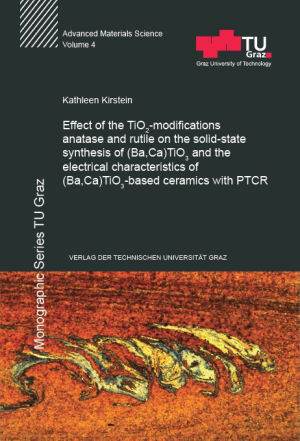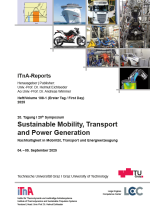Properties of semiconducting Barium Titanate are governed by grain boundary conditions. Prior investigations showed that choice of raw materials and powder processing has a strong influence on the performance of the final product. This publication deals with an investigation on the cause and effect of the use of anatase-TiO2 raw material on the resistance characteristics of donor-doped(Ba,Ca)TiO3-ceramics.
Compositions containing several anatase and rutile raw materials have been prepared with help of the commonly used fabrication process, which includes the solid-state synthesis of n-conducting barium titanate, powder refinement and device shaping as well as the sintering process.
By use of various measurement techniques, it is clearly shown that the crystallographic modifications rutile and anatase are replaceable without any significant effect on the resistance characteristics, providing similar physical and chemical properties such as grain size, specific surface area and impurity content. Further, it is demonstrated and described in detail that the impurities of commercial anatase powders, which are a result of the preparation conditions, strongly affect the resistance characteristics by influencing the calcination as well as the sintering mechanism.
Ausgabe: kartoniert
ISBN: 978-3-85125-203-3
Umfang: 142 Seiten
Sprache: Englisch
Erschienen: Dezember 2012
Reihe: Monographic Series TU Graz / Advanced Materials Science, Band 4
Vergriffen!
Properties of semiconducting Barium Titanate are governed by grain boundary conditions. Prior investigations showed that choice of raw materials and powder processing has a strong influence on the performance of the final product. This publication deals with an investigation on the cause and effect of the use of anatase-TiO2 raw material on the resistance characteristics of donor-doped(Ba,Ca)TiO3-ceramics.
Compositions containing several anatase and rutile raw materials have been prepared with help of the commonly used fabrication process, which includes the solid-state synthesis of n-conducting barium titanate, powder refinement and device shaping as well as the sintering process.
By use of various measurement techniques, it is clearly shown that the crystallographic modifications rutile and anatase are replaceable without any significant effect on the resistance characteristics, providing similar physical and chemical properties such as grain size, specific surface area and impurity content. Further, it is demonstrated and described in detail that the impurities of commercial anatase powders, which are a result of the preparation conditions, strongly affect the resistance characteristics by influencing the calcination as well as the sintering mechanism.






